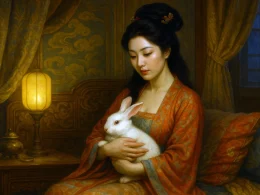My native land's far, far away,
My nostalgia grows day by day.
Alone on rainy autumn night
I hear homing wild geese in flight.
Original Poem
「闻雁」
韦应物
故园眇何处,归思方悠哉。
淮南秋雨夜,高斋闻雁来。
Interpretation
Composed in 783 AD during Emperor Dezong's reign when Wei Yingwu served as the demoted governor of Chuzhou, this poem emerges from an autumn night's contemplation. Sitting alone in his elevated studio amidst rainy darkness, the poet hears distant wild geese cries that stir profound nostalgia for his homeland.
First Couplet: "故园眇何处,归思方悠哉。"
Gù yuán miǎo hé chù, guī sī fāng yōu zāi.
My native land—how far away? Homesickness stretches without end.
The character "眇" (distant/unclear) visualizes the homeland's elusive remoteness, while "悠哉" (endlessly) extends the temporal dimension of longing. This establishes the poem's central tension between unreachable origins and ceaseless yearning.
Second Couplet: "淮南秋雨夜,高斋闻雁来。"
Huáinán qiū yǔ yè, gāo zhāi wén yàn lái.
Huainan's autumn night of rain— From high studio, wild geese cries descend.
The juxtaposition of "Huainan" (current exile) against implied homeland amplifies displacement. The auditory image of geese penetrating rainy darkness becomes an aural metaphor for memories breaking through present desolation.
Artistic Features
This poem employs concise, crystalline language to convey profound nostalgia. Through delicate depictions of autumn rain and geese calls, the poet fuses solitude, melancholy and wistfulness into cohesive imagery. The contrast between "native land" and "Huainan" expresses both homesickness and subtle disillusionment with exile. The work's restrained diction and serene atmosphere embody classical Chinese poetry's refined subtlety.
Holistic Appreciation
The poem progresses from spatial contemplation (1) to sensory immediacy (2), using environmental elements to mirror emotional states. The opening rhetorical question about the homeland's whereabouts establishes existential uncertainty, while the geese's intervention transforms abstract longing into visceral experience. The "high studio" becomes an observatory for both physical landscape and psychological terrain, where seasonal migration patterns underscore human rootedness.
Insight
Wei's poem articulates the universal migrant experience—how geographical displacement amplifies temporal awareness. The wild geese, traditional symbols of message-bearing and seasonal change, represent nature's cyclical returns that highlight human linear separation. For contemporary readers, this Tang masterpiece resonates with modern diasporic consciousness, suggesting that true homesickness involves not just missing a place, but mourning lost versions of oneself that the homeland once contained.
Poem translator
Xu Yuanchong (许渊冲)
About the poet

Wei Yingwu (韦应物), circa 737 - 786, was a native of Chang'an, Beijing. His poems were collected in the Wei Suzhou Collection, which included poems concerned with the plight of the people, expressions of disobedience to the times and indignation against the world, and descriptions of idyllic landscapes, etc., of which the ones describing idyllic landscapes are the most famous, and have been sung by posterity in particular.












